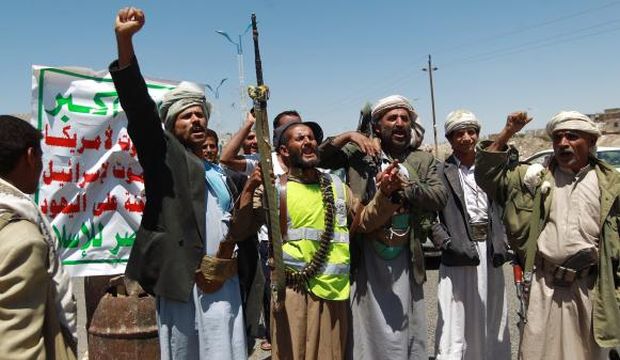The fall of Yemen’s state institutions into the hands of the Houthis without any significant resistance is a remarkable development. More interestingly, Asharq Al-Awsat reported on Monday that a verbal altercation had occurred between the Yemeni President Abd Rabbuh Mansur Hadi and Gen. Ali Mohsin Al-Ahmar.
Reportedly, the argument erupted after President Hadi criticized Ahmar for retreating ahead of the Houthi advance. The newspaper reported that Ahmar responded by walking out of the meeting. But this is not the full story. Yemen’s Minister of Interior Hussein Al-Tarb called on the security forces to cooperate with the Houthis after they occupied many official buildings in Sana’a, instead of confronting them. In a statement published on the Ministry’s website, Tarb called on “all Ministry staff to avoid engaging with the Houthis or be involved in any kind of disputes with them.” The statement urged Ministry employees to rather “cooperate with the Houthis in consolidating security and stability, preserving public property, safeguarding state facilities, which are the property of the people, and considering them as the friends of police.”
What exactly is going on in Yemen? Are the Houthis an occupying force or friends of the Yemeni police? To put it bluntly, is what happened in Sana’a the outcome of an act of treason or conflict? Surely, what is happening is a betrayal of the Yemeni state with all its components and institutions, rather than the international community, Arab Gulf states, Saudi Arabia and Yemenis, including politicians and tribesmen, being to blame for not realizing the seriousness of what is happening in Yemen, a country falling apart after being hit by waves of instability. Following instability stirred up by Al-Qaeda, the Muslim Brotherhood and tribal conflicts, it is now the Houthis—under the auspices of Iran—who are seeking to dominate Yemen’s fragile domestic political scene. How absurd! How can it be said that the Houthis are friends of the police and partners in state institutions while they continue shelling and laying siege to Sana’a?
How can the Houthis be friends of the police while they are occupying and hoisting their flags atop the building of the General Command of the Armed Forces, seizing the buildings of the Shura Council and parliament, Sana’a radio station and the Iman University? Not to mention the conflicting reports about the Ministry of Defense falling into rebel hands and the taking of the headquarters of the Fourth Brigade. What kind of partners are they? It is puzzling, indeed.
Whatever the situation in Yemen truly is, whether it is betrayal or conflict, the security of our region, particularly in the Gulf, should not be subjected to the whims of warlords setting their country ablaze and threatening our security. The Gulf states must develop an effective plan to deal with Yemen and its latest dangerous crisis. The security of the Gulf is far too important to be left in the hands of adventurers.

Trackbacks/Pingbacks